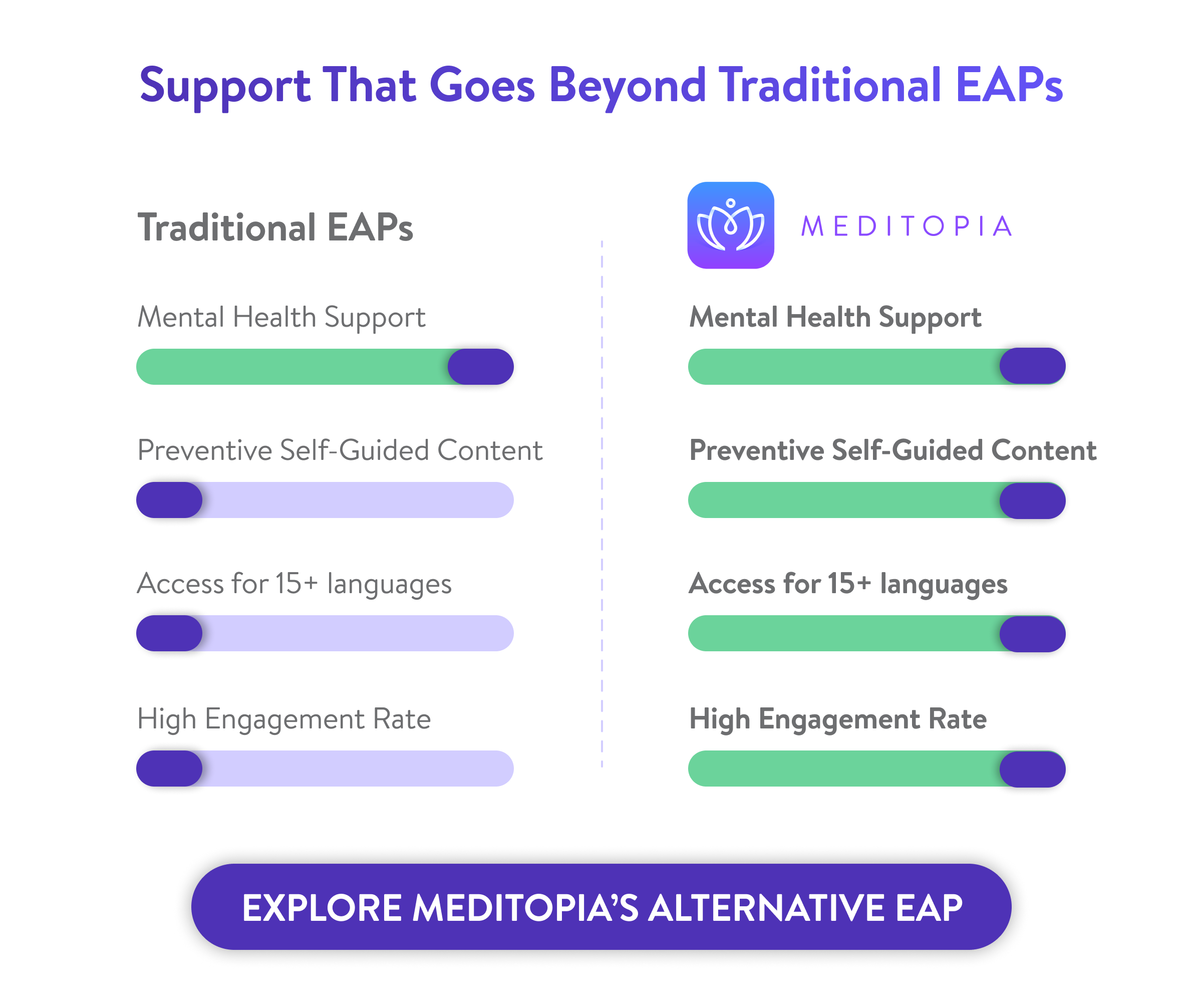Japan just crossed a stark threshold: in FY2024 the Ministry of Health, Labour and Welfare (MHLW) recognized 1,055 work-related mental health disorders, the first time this figure has topped 1,000 [1]. EAP providers can become gamechanger for Japanese organizations through personalized employee wellbeing support; keep reading to discover the best EAP providers in Japan, and how they adapt to your unique corporate wellness needs.
Top Employee Assistance Programs in Japan
As more organizations look beyond compliance, a new mix of traditional and modern EAP vendors has emerged, each offering different models of care, from classic counseling to digital-first engagement with gamification. Below is a curated list of EAP companies operating in Japan, each with a short profile and summary table.

1) Meditopia for Work
A next-gen EAP combining expert counseling with a rich digital experience. Designed to turn compliance into real outcomes with measurable engagement and habit-building, fit for modern employer-sponsored benefits portfolios and Japanese focused corporations, thanks to its cultural focus.

Key services:
- 1:1 counseling (psychologists, dietitians, PTs, coaches)
- AI assistant SOUL, talk about anything in a safe space, receive guidance, and content recommendations
- 24/7 support, online/offline
- 10,000+ wellbeing content in 14 languages (Japanese included)
- Personalized and engaging workshops and webinars for employees and managers
Unique selling points:
- Gamified challenges & rewards
- Peer recognition and corporate but engaging social network
- 42% engagement rate, that's 32% higher than classic EAPs
Pricing model:
- Per-employee subscription; employer contract with optional individual add-ons
2) MantraCare
MantraCare emphasizes affordability and reach for hybrid teams in Japan, with strong tele-counseling and coaching, useful when you prioritize remote EAP services without heavy on-site operations. Their materials highlight quick access and crisis handling for dispersed workforces.
Key services
- Counseling, wellness coaching, workshops and assessments
- Hotline/chat/video access across time zones
- Crisis handling pathways for distributed teams
Unique selling points
- Mobile-centric experience that reaches field and deskless workers
- Global content breadth beyond mental health (e.g., chronic care)
MantraCare
Pricing model
- Tiered employer subscriptions; session-based options available.
3) Tokyo Mental Health (TMH)
TMH bridges workplace support with clinical psychiatry, trusted among EAP mental health providers when you need bilingual counseling plus clear escalation into medical care. It’s also one of the most explicit in offering crisis intervention.
Key services
- Bilingual (JP/EN) counseling and management consultations
- Crisis response management; concierge navigation to psychiatry
Unique selling points
- Clinical-workplace integration with psychiatrist collaboration
- Clear protocols for urgent mental-health needs
Pricing model
- Employer contracts; session-based billing for counseling/psychiatric consults.
4) Human Frontier
A long-standing domestic specialist with nationwide counselor coverage, Human Frontier focuses on return-to-work, relapse prevention, and family-inclusive counseling. For companies aiming to strengthen work-life balance and compliance with Japanese occupational health practices, it’s a dependable, local partner.
Key services
- EAP counseling for employees and household members
- Return-to-work and relapse-prevention programs with continuity
Unique selling points
- Deep local know-how and ISO-aligned quality practices
- Consistency (same counselor through the case)
- Strong fit for regulated or legacy enterprise environments
Pricing model
- Annual employer contracts; modular add-ons for training/RTW
5) PEACEMIND
PEACEMIND is a veteran Japanese provider with extensive enterprise references and stress-check operations. It sits among the largest eap providers locally, especially for compliance-heavy rollouts.
Key services
- EAP counseling, stress-check delivery, organizational analysis and trainings
- Privacy/ISMS certifications and national implementation capacity
Unique selling points
- Scale and reliability for large, multi-site employers
- Compliance strength (stress checks, data governance)
- Established brand and enterprise client base
Pricing model
- Employer subscriptions; per-service pricing for stress checks/trainings.
6) Japan EAP Systems (JES)
JES is a pioneer brand with standardized corporate programs and a long track record. Many conservative enterprises prefer JES for predictable nationwide delivery and manager trainings, one of the steadier eap vendors if you want proven frameworks.
Key services
- Counseling, mental-health assessments, manager training
- Structured case management and referral pathways
Unique selling points
- Standardized processes at national scale
- Fit for companies that value continuity and predictability
Pricing model
- Annual employer contracts; modular programs and workshops.
7) Benesse Wellbeing Support
Benesse Wellbeing Support is part of the Benesse Group and is widely recognized in Japan for combining EAP services with educational, developmental, and organizational wellbeing programs.
Key services:
- Employee and manager counseling services
- Stress Check Program implementation and follow-up care
- Mental health training for managers and HR
Unique selling points:
- Strong integration of learning, prevention, and mental health support
- Deep cultural alignment with Japanese workplace norms
Pricing model:
Employer contracts; pricing varies by service scope (EAP, stress checks, training modules)
Extended List of EAPs in Japan
How to Choose the Right EAP Companies in Japan
For Japanese organizations, the decision can shape employee trust, wellbeing, and even retention. With so many vendors, HR leaders need clear criteria to separate average providers from the best EAP providers. When evaluating potential partners, consider these factors:
- Scope of Services: The strongest EAPs cover not only counseling but also nutritional guidance, fitness, and financial coaching.
- Reviewing examples of employee assistance programs in Japan shows that multi-disciplinary support produces higher utilization, because employees can find help that fits their specific situation.
- Accessibility and Language: Japan’s workforce is diverse and includes expatriates. An effective EAP like Meditopia should offer bilingual services and easy access via apps, web, and hotlines. 24/7 availability is especially critical for crisis situations.
- Engagement Tools: Providers that add gamification, peer recognition, or habit-building challenges can motivate employees to use services regularly, turning the EAP into a proactive wellbeing driver.
- Compliance and Integration: The Stress Check Program is mandatory in Japan. The right partner should align with this requirement, offering not just assessments but also seamless post-check care.
- Employer Fit: For SMEs, flexibility matters; for large enterprises, coverage and standardization are essential. Ultimately, the EAP should slot naturally into your broader HR support services strategy, complementing L&D, DEI, and occupational health.
Why EAPs Are Essential for Businesses in Japan
Long working hours, a culture of endurance, and the rising recognition of power harassment have made mental health one of the most pressing workplace challenges in Japan. Here are a few reasons why employee assistance program providers are essential in this nation:
- Suicides in Japan totaled 21,837 in 2023; among them, 8,858 were employed persons. “Work-related issues” were recorded as a contributing factor in 2,875 of those cases [2].
- In FY2024 claims data, MHLW saw a record 3,780 applications for workers’ compensation due to mental illness, with 1,055 cases certified and 88 involving suicide or attempts, evidence of rising workplace strain that EAPs are designed to triage early [3].
- Since 2015, Japan has mandated the Stress Check Program under the Industrial Safety and Health Act for all workplaces with 50 or more employees. Once a year, companies must administer a standardized questionnaire that measures psychosocial stress factors such as workload, interpersonal relationships, and perceived support [4].
- The OECD estimates mental ill-health can cost economies up to ~4% of GDP through lower employment and productivity—making prevention and early intervention via EAPs a CFO topic, not just an HR one [5].
- A study estimated Japan’s national cost for depression (medical, suicide, workplace) at about USD 11 billion, with USD 6.9 billion of that coming from workplace costs (lost productivity, absenteeism) alone [6].
- The estimated productivity loss from mental health–related presenteeism is $46.73 billion annually, with absenteeism adding another $1.85 billion, together representing about 1.1 % of Japan’s GDP [7].
EAP Usage Statistics in Japan
Although Japan has been grappling with workplace stress and mental health for decades, the actual adoption and usage of Employee Assistance Programs has been relatively modest compared to Western markets. Cultural stigma, limited awareness, and a fragmented provider landscape have slowed growth.
- In a descriptive survey of 27 EAP providers in Japan, only 13 (54.2%) responded. Many reported low visibility and inconsistent tracking of usage, often due to lack of internal promotion, and hiring classic EAP vendors with no engaging content or programs [8].
- A 2-year cohort study among male IT workers showed that introducing an EAP led to a significant reduction in suicidal ideation, demonstrating effectiveness even at modest uptake [9].
- The Japanese EAP services market was valued at approximately ¥21.4 billion in FY2014 (≈ USD 200 million) [10], with slow but steady growth reported thereafter. This means more Japanese companies are caring for their employees wellbeing, and contacting EAP service providers.
- Reviews note persistent challenges: low awareness, lack of standardization, and cultural reluctance to seek professional help through formal workplace channels [11].
Explore EAP Companies Around the World
Interested in how the Employee Assistance Program market looks outside Japan? Take a look at different regions to see how employee assistance services are evolving globally and which providers are shaping the landscape.


.jpg)






















